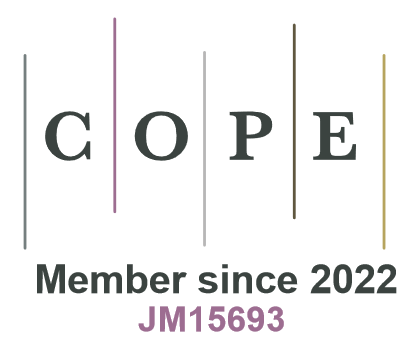Anthropometric characteristic and body composition of female students involved in volleyball training
DOI:
https://doi.org/10.18778/1898-6773.85.4.03Keywords:
anthropometry, female players, playing positions, bioelectrical impedance, body proportions, Heath-Carter somatotypeAbstract
There have been only few studies investigating the anthropometric characteristics of female volleyball players. These studies have revealed a positive influence of volleyball training on the physical development and fitness level among girls and women. The aim of the study was to assess the anthropometric profile of young female volleyball players.
Our sample consisted of twelve female volleyball players aged between 18-21 years with at least 5 years of training experience. The body height and mass, the thickness of skinfolds, longitudinal dimensions of the body, girth and breadths were measured. The body composition was determined using anthropometric and bioimpedance methods. Somatotype was determined according to the calculating method of J. E. L. Carter.
The body height of the volleyball players was estimated as high, and the body mass – higher than average. Middle shoulders, narrow pelvis and prevailing of longitudinal dimensions were the most distinctive features of the body proportions of the female volleyball players. Although their thorax was narrow, the respiratory muscles were well developed. The male type of proportions was typical for players exhibiting a theinoid scheme (middle shoulders, long legs) according to V.V. Bunak. Our data showed high development of the muscular component of the body of volleyball players, comparable to females professionally involved in sport . Index of muscle development, based on the excursion of the shoulder muscles, was typical for female athletes – 9,92 ± 2,98 cm. We also found that the relative mass of the fat component was within the normal range for elite volleyball players. The central somatotype was found to be typical for the female volleyball players: endomorphy – 3,98 ± 0,58, mesomorphy – 3,38 ± 1,01, and ectomorphy – 3,67 ± 0,76.
The obtained results describe the morphological profile of female volleyball players and can be used for the monitoring of their fitness level.
Downloads
References
Bozo D, Lleshi E. 2012. Comparison of Albanian female volleyball players with anthropometric, performance and haematological parameters. J Hum Sport Exercise 7(1):41–50.
View in Google Scholar
DOI: https://doi.org/10.4100/jhse.2012.7.Proc1.06
Buśko K, Lipińska M. 2012. A comparative analysis of the anthropometric method and bioelectrical impedance analysis on changes in body composition of female volleyball players during the 2010/2011 season. Human Movement 13(2), https://doi.org/10.2478/v10038-012-0013-6
View in Google Scholar
DOI: https://doi.org/10.2478/v10038-012-0013-6
Carter JEL. 1990. Somatotyping-development and applications. Cambridge University Press.
View in Google Scholar
Carter J. 2002. The Heath-Carter Anthropometric Somatotype – Instruction Manual. Surrey TeP and ROSSCRAFT.
View in Google Scholar
Carvajal W, Betancourt H, León S, Deturnel Y, Martínez M, Echevarría I. et al. 2012. Kinanthropometric profile of Cuban women olympic volleyball champions. MEDICC Rev 14(2):16, https://doi.org/10.37757/mr2012v14.n2.6
View in Google Scholar
DOI: https://doi.org/10.37757/MR2012V14.N2.6
Carvajal VW, León PS, González RME, Echevarría GIY, Martínez AM. 2015. Morphological changes of elite Cuban female volleyball players, 1984-2008. Rev Esp Antrop Fís 36:33–44.
View in Google Scholar
D’Anastasio R, Milivojevic A, Cilli J, Icaro I, Viciano J. 2019. Anthropometric Profiles and Somatotypes of Female Volleyball and Beach Volleyball Players. Int J Morphol 37(4):1480–5.
View in Google Scholar
DOI: https://doi.org/10.4067/S0717-95022019000401480
Fomin EV, Bulykina LV, Sukhanov AV. 2012. Techno-tactical training of volleyball players: manual [in Russian]. Moscow: VFV.
View in Google Scholar
Grgantov Z, Padulo J, Milić M, Ardigò LP, Erceg M, Cular D. 2017. Intra-positional and inter-positional differences in somatotype components and proportions of particular somatotype categories in youth volleyball players. Ann Appl Sport Sci 5(2):37–49.
View in Google Scholar
DOI: https://doi.org/10.18869/acadpub.aassjournal.5.2.37
Gualdi-Russo E, Zaccagni L. 2001. Somatotype, role and performance in elite volleyball players. J Sports Med Phys Fitness 41(2):256–62.
View in Google Scholar
Hrynkiv M, Kutseryb T, Vovkanych L, Muzyka F. 2018. Influence of basketball training on the physical development of female athletes [in Ukrainian]. Sport Sci Ukraine 84(2):9–13.
View in Google Scholar
Konstantinos NS, Panagiotis MG, Ioannis BA. 2019. Morphological characteristics of adolescent elite female handball and volleyball players. J Phys Educ Sport 19(4):1502–07.
View in Google Scholar
Kuczmarski RJ. 2002. 2000 CDC growth charts for the United States: Methods and development. Hyattsville, MD: Dept. of Health and Human Services, Centers for Disease Control and Prevention, National Center for Health Statistics.
View in Google Scholar
Kutseryb T, Hrynkiv M, Vovkanych L, Muzyka F. 2018. Body proportions and somatotype of female basketball players [in Ukrainian]. Sport Sci Ukraine 87(5):20–4.
View in Google Scholar
Kutseryb T, Hrynkiv M, Vovkanych L, Muzyka, F. 2019. Influence of basketball training on the features of women’s physique. J Phys Educ Sport 19(4):2384–9.
View in Google Scholar
Kutseryb T, Vovkanych L, Hrynkiv M, Majevska S., Muzyka F. 2017. Peculiarities of the somatotype of athletes with different directions of the training process. J Phys Educ Sport 17(1):431–5.
View in Google Scholar
Łaska-Mierzejewska T. 2008. Ćwiczenia z antropologii. Warszawa.
View in Google Scholar
Malinowski A, Bożiłow W. 1997. Podstawy antropometrii. Metody, techniki, normy. Warszawa: PWN.
View in Google Scholar
Malousaris GG, Bergeles NK, Barzouka KG, Bayios IA, Nassis GP, Koskolou MD. 2008. Somatotype, size and body composition of competitive female volleyball players. J Sci Med Sport 11(3):337–44, https://doi.org/10.1016/j.jsams.2006.11.008
View in Google Scholar
DOI: https://doi.org/10.1016/j.jsams.2006.11.008
Martín-Matillas M, Valadés D, Hernández-Hernández E, Olea-Serrano F, Sjöström M, Delgado-Fernández M, et al. 2013. Anthropometric, body composition and somatotype characteristics of elite female volleyball players from the highest Spanish League. J Sports Sci 32(2):137–48, https://doi.org/10.1080/02640414.2013.809472
View in Google Scholar
DOI: https://doi.org/10.1080/02640414.2013.809472
Martirosov EG, Nikolaev DV, Rudnev SG. 2006. Technologies and methods for determining the composition of the human body [in Russian]. Moscow: Nauka.
View in Google Scholar
Martirosov EG. 1982. Research methods in sport anthropology [in Russian]. Moscow: Physical Culture and Sport.
View in Google Scholar
Milić M, Grgantov Z, Chamari K, Ardigò LP, Bianco A, Padulo J. 2017. Anthropometric and physical characteristics allow differentiation of young female volleyball players according to playing position and level of expertise. Biol Sport 1:19–26, https://doi.org/10.5114/biolsport.2017.63382
View in Google Scholar
DOI: https://doi.org/10.5114/biolsport.2017.63382
Nikolaev DV, Smirnov AV, Bobrinskaya IG, Rudnev SG. 2009. Bioelectric impedance analysis of human body composition [in Russian]. Moscow: Nauka.
View in Google Scholar
Papadopoulou S. 2003. Anthropometric characteristics and body composition of Greek elite women volleyball players. In: H Ridder and T. Olds, editors. Kinanthropometry 7th edition. Potchefstroom, RSA: Potchefstroom University for Christian Higher Education 93–110.
View in Google Scholar
Pastuszak A, Buśko K, Kalka E. 2016. Somatotype and body composition of volleyball players and untrained female students – reference group for comparison in Sport. Anthropol Rev 79(4):461–70, https://doi.org/10.1515/anre-2016-0033
View in Google Scholar
DOI: https://doi.org/10.1515/anre-2016-0033
Pietraszewska J, Burdukiewicz A, Stachoń A, Andrzejewska J, Pietraszewski B. 2015. Anthropometric characteristics and lower limb power of professional female volleyball players. S Afr J Res Sport Phys Educ Recreat 37(1):99–111.
View in Google Scholar
Sarafyniuk LA, Khapitska OP, Sarafyniuk PV, Koliadenko SV, Cherkasova LA. 2020. Change of anthropometric indicators in qualified young women volleyball players during the annual training macrocycle. Rep Morphol 26(1):14–18.
View in Google Scholar
DOI: https://doi.org/10.31393/morphology-journal-2020-26(1)-02
Sarafyniuk LA, Pivtorak VI, Khavtur VO, Fedoniuk LI, Khapitska OP. 2018. Peculiarities of the chest’s size in female volleyball players of different constitutional types. Biomed Biosoci Anthrop 33:47–52, https://doi.org/10.31393/bba33-2018-8
View in Google Scholar
DOI: https://doi.org/10.31393/bba33-2018-8
Sergienko LP. The basics of Sport Genetics [in Russian]. Kyiv: Vuscha Shkola. 2004.
View in Google Scholar
Tsunawake N, Tahara Y, Moji K, Muraki S, Minowa K, Yukawa K. 2003. Body composition and physical fitness of female volleyball and basketball players of the Japan inter-high school championship teams. J Physiol Anthropol Appl Human Sci 22(4):195–201, https://doi.org/10.2114/jpa.22.195
View in Google Scholar
DOI: https://doi.org/10.2114/jpa.22.195
Published
How to Cite
Issue
Section
License

This work is licensed under a Creative Commons Attribution-NonCommercial-NoDerivatives 4.0 International License.








